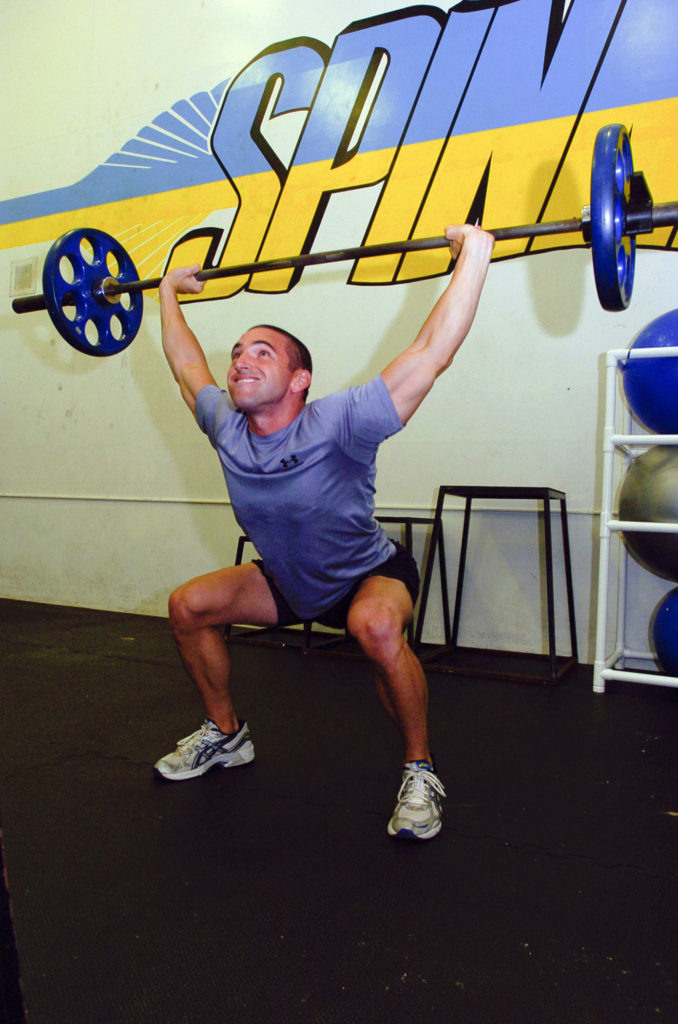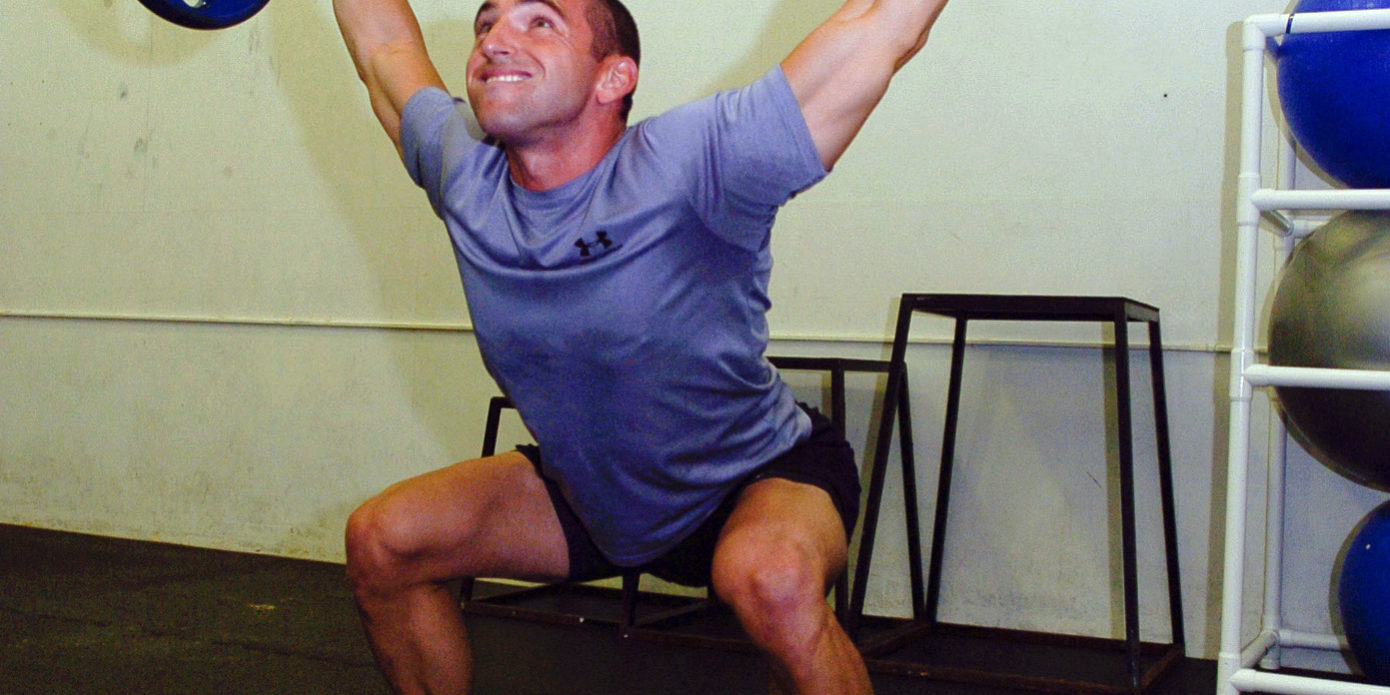
The documentary film American Weightlifting, which was produced, directed, and filmed by Greg Everett, offers an inspiring perspective on an obscure yet fascinating sport.
Personal Connection and Fulfillment
My own love for lifting was born from the desire for push myself through sport, and the reward of pursuing that skill. Greg Everett and Mike Burgener, a weight lifting coach featured in the film, were my mentors and role models. They gave me an experience that has transformed my life in many ways. For me, snatches are among the closest unions with nature I have ever felt. It is an expression of ultimate preparedness, willingness, and follow through. While experiencing the brief seconds of the lift, the athlete is not aware of the elements so carefully acquired to perform this feat. It is like the universe stands still; your mind is quiet; you do not have time to try, you just do. When it’s all over you feel a fulfillment beyond description.
In the film, this fulfillment is perfectly expressed in the face of Aimee Everett as she receives the bar and ascends. Before she lets the bar drop, there is a smile so deep and genuine it speaks for itself. The personal connection of athlete and fulfillment is the deep subtext of the film. That kind of experience is needed in our society, not just in athletics but in academics, business, and art.
The Plight of Weightlifting in America
On another level, the film displays the plight of weightlifting as a professional competitive sport in America. It is structured as a series of interviews with coaches across the country, diving into their history and contribution to the sport as it exists today. When discussing the struggle this sport faces, these honest and dedicated characters can’t help but have a somber tone as they describe their experience in the sport. Due to the low level of visibility weightlifting has in America, it receives inadequate support. The technical aspects of weightlifting coupled with its poor reception in America requires those who choose to participate to have a love for the sport, and an inherent desire to perform without the need for popular recognition.
Dedication and Desire to Perform
The modesty and humility expressed in the interviews provides the audience with a window into the participants’ lives that simply watching the sport cannot portray. Dedication to the sport transforms the athletes into coaches, teachers, and leaders. They are personally driven to better the community in a way that goes beyond athletics. For this reason the film transcends the subject of competitive weightlifting. It reaches beyond the interest of a common spectator and addresses a broader audience than the typical sports documentary.
Professional sports in America has, for the most part, lost the romance of athleticism. The desire to perform has to a large extent been transformed into the want for material wealth and fame. In America an athlete’s success is measured to a large degree by their popularity. Their name and face are a greater source of income and respect than their performance. Weightlifting does not have the glamor and popularity of major spectator sports, making recruitment and development of internationally competitive American athletes a challenge.
As coach Bob Takano says during his interview, “This is one of the areas America is not very good. We are not very good at supporting activities that don’t generate revenue. We do not support things for cultures sake we support things for money’s sake.” He continues to predict that “until we can figure out that we need to support some things that are not necessarily going to generate revenue, we are not going to (be able to support weightlifting in America).” The film itself provides an approach to supporting weightlifting that is rooted in the love of its participants, and its contribution to their personal growth.
As soon as the soft scratchy voice of Mike Burgener cuts in, the authenticity of the movie is immediately apparent. There is not a forced or scripted moment in the entire film. Coach Burgener’s opening segment is an excellent microcosm of weightlifting’s life in America. The way he came to find the sport and pursued it as an athlete until he could pass the torch and cultivate the skills necessary in another generation of athletes is a theme echoed in the voices of all the characters within the documentary. This film offers a view of how weightlifting coaches and athletes in America are brought together today. It is a relationship that must be built on a true desire for participating in the sport without any need for incentive outside of the satisfaction of performing in a sport they love.
Sense of Community
The intense personal accomplishment and development in the athletes brings them into a close community. Aimee Everett describes herself as a “lost little girl without any direction” and when she met Coach Burgener “the sky opened up.” She speaks of her love for being strong, chasing numbers, and perfecting technique, but what she says is that at the end of the day what she loves most about weightlifting is “it keeps me close to the people I love.” The people she calls her family. The film describes the transformative nature of this sport and its value to its participant community.
The Future of Weightlifting
The film subtly portrays the value coaches see in the personal growth of participants as a promise for a healthy future for the sport. Kevin Doherty, a high school coach in San Francisco, is currently giving all he has to any student expressing an interest in lifting. The sacrifice that was necessary to cultivate lifting teams in the beginning when coach Burgener was a young athlete at Notre Dame is still necessary today. Very little community support is given to facilitate the needs of a lifting team. He teaches French, P.E., Health and Avid (a program for aiding in study) so he can coach weightlifting at his school. His weight lifting room is an environment in which the attention given to the participant is determined primarily by their interest and dedication to perform not just how much inherent talent or potential they possess. The fruit of this labor is captured in views of the classroom and statements by the coach while the young athletes are lifting on screen. The sequence ends with a young man’s valiant performance in a local competition. Coach Doherty’s passion and support are obvious as his student exudes humble satisfaction and confidence after his performance.
Greg Everett conveys this belief in the opportunity for personal growth as a stepping stone to recruiting and training athletes who are truly competitive internationally. He says within his own documentary that he is not a great coach and that he is not making money doing it. He participates so fully in the sport because he has hope for the future of weightlifting in America. He believes that we do not need to change the sport to create an audience which will bring a more significant revenue stream, and thus increase the attractive nature of the sport to a larger body of young athletes.
The possibility for Gregg Everett’s hopes for America’s improved performance in weightlifting is punctuated in a sequence capturing a Sacramento high school weight lifting program. In this segment, the film shows the possibility of larger scale American weightlifting recruitment programs. These program platforms are based in the appeal of the sport for personal growth in young athletes, and they could be large enough to begin to develop athletes from a greater talent base. This is necessary for American teams to become strong enough to prevail in international competitive arenas. American Weightlifting challenges the idea that America will only nurture aspects of our community based on financial incentive, and it shows you that the true love of athleticism is still alive in our community today.
The Value of Weightlifting in Our Society
In the end, American Weightlifting raises hope that the sport may attract the support it needs to flourish. Whether or not this happens does not change the value the sport is already offering American society. The strength, determination, and fulfillment born through this labor of love are character qualities which produce individuals that enrich our population in a way that notoriety and financial success can not replace. We need more weightlifters, not just to entertain and compete, but also to touch the lives of those around them and spread the quality of character they developed in the sport.




